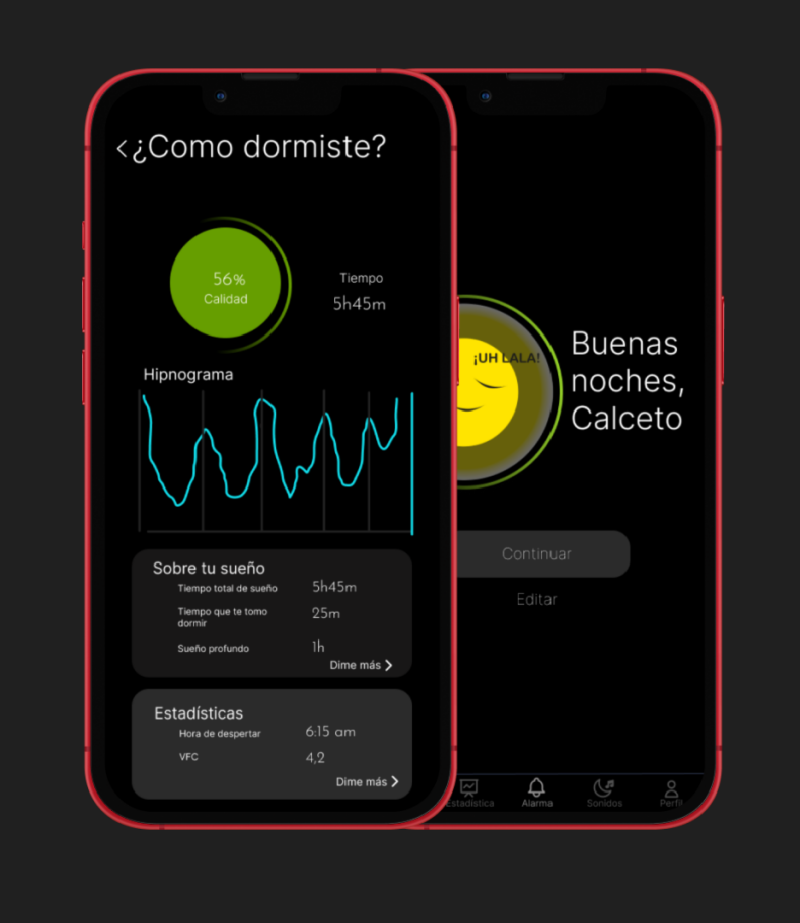
Sleep Quality Issues in Mexico
High Prevalence
Over 35% of Mexican adults suffer from poor sleep quality, affecting productivity and health.
Lack of Personalization
Most current devices don't offer recommendations tailored to local needs.
Limited Accessibility
Existing solutions are expensive and not designed for the Mexican population.
Comprehensive Sleep Monitoring System
Wearable Device
Comfortable wristband that monitors sleep patterns with advanced sensors.
Smart Mobile App
Provides personalized sleep strategies based on collected data.
Calendar Integration
Recommendations tailored to the user's schedule and routine.
Adaptive AI
Algorithms that improve suggestions based on user progress.
Innovative Design Journey
RESEARCH & ANALYSIS
Identified user needs for better sleep and actionable insights.
Analyzed existing solutions and their shortcomings in the Mexican market.
DESIGN & IDEATION
Designed a comfortable wearable band with focus on aesthetics.
Created an intuitive digital interface for sleep tracking.
Developed a system connecting sleep data with calendar events.
Mapped virtuous and vicious cycles in user sleep patterns.
SYSTEM INTEGRATION
Ensured seamless integration between user, band, app and AI.
Designed for continuous improvement through user feedback.
USER EXPERIENCE
Understanding Mexico's Sleep Challenges
To ensure relevance for the Mexican market, I combined quantitative and qualitative research methods to understand user needs and cultural sleep patterns.
Research Methodology
A comprehensive approach combining multiple research methods
Quantitative Research
50+ participant surveys helped identify key pain points related to sleep quality, stress, and device usability across different demographics and regions in Mexico.
Qualitative Research
Semi-structured interviews with 10-15 focused individuals uncovered behavioral patterns and contextual needs specific to Mexican users' lifestyle and cultural habits.
App Store Analysis
Analyzed 200+ app store reviews from popular sleep apps used in Latin America (Sleep Cycle, SleepScore) to benchmark user expectations and common frustrations.
Secondary Research
Data from INEGI, ENSANUT, and academic publications on Mexican sleep behavior provided statistical foundation and cultural context for the research findings.
Key Research Findings
of users value features like sleep journaling and personalized alarms tailored to their lifestyle, preferring non-invasive and affordable solutions over complex devices.
want integration with wearable devices they already own, including smartwatches and fitness bands, rather than purchasing additional hardware for sleep tracking.
Mexican users interviewed emphasized the need for simple interfaces, real-time feedback, and seamless integration with existing wearables and daily routines.
Cultural Context Insights
Research revealed that customized tracking considering cultural sleep patterns is essential for user engagement. Noise, irregular schedules, and family dynamics significantly affect sleep patterns in Mexican households, requiring solutions that adapt to these unique environmental and social factors.
( Source:Revista Mexicana de Psicología, 2022)
Results & Impact
Although academic, goals were set based on regional studies and app benchmarks:
- Targeting a 20-25% improvement in sleep quality measured through user surveys.
- Aiming to reduce time to fall asleep by 10-15 minutes.
- Increase user satisfaction by 25-30% compared to local competitors.



Material Palette
Calm and Relaxation: Black and grey tones create a calmand soothing enviroment, helping to reduce visual noise and promote relaxation, essential for a sleep-focused app.
Contrast and Accessibility: The dark background allows for better contrast with text and icons, improving readability and making the interface more accesible, especially in low-light environments (like when users are about to sleep).
Consistency: The minimal color palette reflects simplicity and consistency, aligning with the goal of helping users feel in control and at ease.
Wearable Band:
Biometric sensors for sleep tracking.
Comfortable design with soft silicone and fabric.
Stylish finishes with brushed titanium edges and a
magnetic clasp.
Mobile App:
Visualizes sleep data in an easy-to-understand format. Provides personalized strategies to improve sleep.
Syncs with the user’s calendar for tailored suggestions.
Uses AI to adapt strategies based on user progress.

Step-by-Step
Wear the Band
User wears the sleep tracking band before bedtime
Data Collection
App collects and analyzes sleep data automatically
Morning Report
User receives personalized sleep insights
Select Plan
User chooses daily improvement strategies
Auto Tracking
System continues monitoring during sleep
Deep Analysis
Advanced sleep pattern tracking activated
Sleep Reminder
App notifies when it's bedtime
Follow Routine
User completes daily sleep plan
Notes to My Future Self
Lessons Learned
-
User-Centered Design: Focused on user pain points to create actionable sleep-tracking solutions.
-
Seamless Integration: Combined hardware (wearable band) and software (app) for a cohesive experience.
-
AI + Simplicity: Balanced advanced AI insights with an intuitive, user-friendly interface.
-
Iterative Testing: Refined designs through multiple rounds of usability testing with real users.
Future Improvements
-
Enhanced AI: Expand algorithms for personalized sleep strategies based on stress and activity levels.
-
Gamification: Add rewards for consistent sleep patterns to boost user motivation.
-
Smart Home Sync: Integrate with devices (lights, thermostats) for an optimal sleep environment.
-
Global Reach: Adapt for different languages and cultural sleep habits.
-
Health Ecosystem: Sync with fitness and meditation apps for holistic well-being.
Why This Project Stands Out
-
User Research: Identified market gaps by understanding frustrations with existing sleep-tracking apps.
-
Strategic Thinking: Designed a holistic solution combining hardware, software, and AI.
-
Collaboration: Worked with a team to create both the physical band and digital interface.
-
Visual Communication: Built a visually appealing, intuitive app interface.
-
Innovation: Integrated AI and calendar sync for a personalized user experience.

